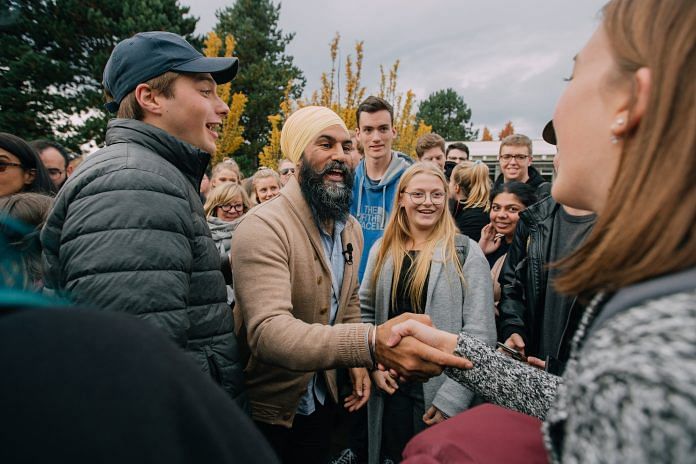Canadians are heading to the polls in their ridings (the great name for Canadian legislative districts) on Monday. While it’s expected to be a close contest between the Liberal Party, led by Prime Minister Justin Trudeau, and the Conservative Party, led by Andrew Scheer, there are several other parties in the mix, too. To get a sense of it, I spoke over email with political scientist Amanda Bittner, a professor at Memorial University of Newfoundland who directs the Gender and Politics Lab there. She’s an expert on voting, public opinion and gender, and the author of “Platform or Personality? The Role of Party Leaders in Elections.”
Jonathan Bernstein: What’s the most important thing those of us outside Canada should know about the elections?
Amanda Bittner: I think the most remarkable thing is the role of “diversity” in candidates and leaders. This is a historic election in Canada given that it’s the first time we have a member of the Sikh community running as the leader of a major party; more than that, it’s the first time we have a nonwhite leader at the helm of a major party.
The proportion of women candidates has increased and is at a historic high at about 37% of candidates. The proportion of visible minority candidates is sitting at about 15% overall, with the highest proportion running for the New Democratic Party (24%). Historically, none of the parties have done very well in this regard (and the NDP has a fairly bad track record), so this change is important in that it signals that the party is taking diversity more seriously and making more of an effort to recruit candidates.
There has also been an increase in the proportion of indigenous candidates running in the election; the Assembly of First Nations has stated publicly that there are 62 indigenous candidates running, up from 54 in 2015.
JB: Americans are used to a two-party system, and have been told that “first past the post” elections — single-district elections in which candidates in each constituency win if they receive the most votes, even if they didn’t win a majority of the total tally — is a big reason why Democrats and Republicans combine to be so successful in the U.S. And yet Canada has the same type of system, but very different results. What accounts for how Canada has evolved into a multiparty system?
AB: Lots of academics have spilled lots of sweat and tears over this question. I think the easiest way to explain the emergence of a multiparty system is that regionalism in Canada tends to exacerbate differences of opinion. Some parties (e.g., Bloc Quebecois) emerged out of interests that are concentrated in a single region, and parties are able to work with the electoral system to concentrate their support within specific ridings, thus gaining seats. This means that, depending on the ground game, smaller parties without broad-based national support (e.g., let’s say they get 10% of the national vote) can actually win quite a number of seats if the vote share is concentrated, thus getting them the most votes (and therefore a seat) in a given district.
Canada is known to be one of a few international outliers, though, with a multiparty system even though theoretically this should not be the norm. Most single-member plurality systems do not result in multiparty systems like ours.
JB: How is the multiparty system likely to play out in this election and in the formation of a government?
AB: Well, I would say that the regionalization of political attitudes is likely to play out as described. Right now, the Green Party is polling slightly higher than the Bloc Quebecois, for example, but the Greens are likely to win fewer than 10 seats (and 10 would be a record for them), while the Bloc is probably going to win somewhere between 20 and 50 seats (and 50 would be impressive at this moment of the campaign). The Bloc has regional concentration of support, while the Green Party has support that’s diffused across the country, so they’re not able to benefit from the electoral system in the same way.
Because all of these parties are able to gain some seats, they remove the concentration of seats held by the governing party, so we’re looking at the possibility of minority governments right now, where the party with the most seats does not have more than half of the seats in the House of Commons. They will then need to negotiate and compromise with the other parties in order to pass laws and accomplish their goals.
This is fairly routine in other parts of the world, where minority governments and coalition governments are the norm. We have had some minority governments in the past, so it’s not totally abnormal for Canada either. I think the parties are doing a lot of fear-mongering at the moment, trying to convince voters to vote for them “or else” … but actually a lot of folks think that being required to debate and negotiate across party lines is healthy for democracy.
JB: Last question. Does anyone care about Barack Obama’s endorsement of Justin Trudeau?
AB: My dad does. Made some jokes about foreign interference in elections.
I am not sure that it will matter. Trudeau supporters will be pleased; Obama fans who aren’t Trudeau supporters will probably be upset or maybe roll their eyes. People who dislike Trudeau and dislike Obama will also roll their eyes. They did have a bit of a bromance a few years ago (at least, the media made it seem as though they were chummy), so it’s maybe not that surprising.



